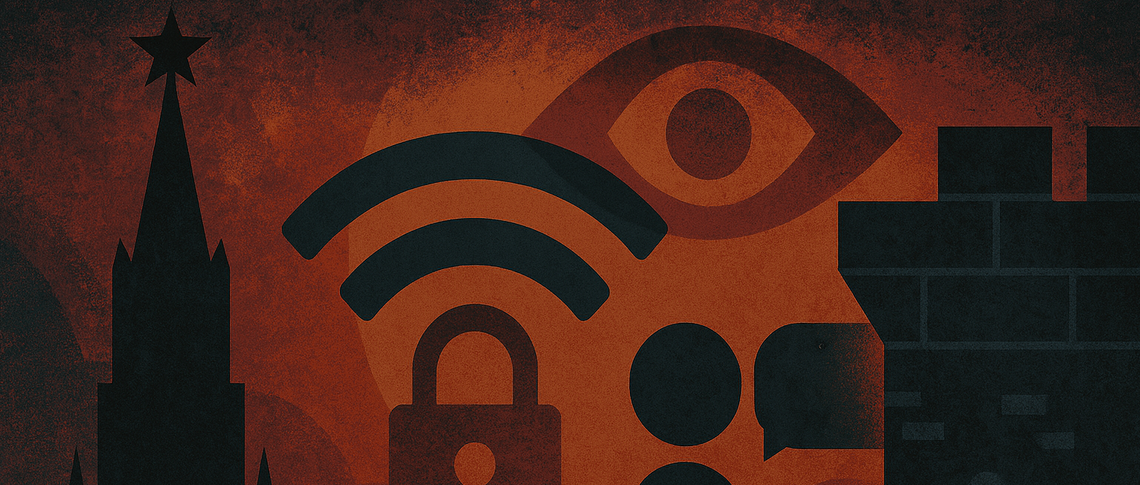As the Russian autocracy gradually became more and more repressive over the course of the 2010s, the Russian-language internet, or Runet, initially remained a comparatively free space — in stark contrast to the traditional media, which increasingly toed the government line. Even when in 2022, Russia’s last opposition radio and television broadcasters disappeared, it seemed as though, thanks to the power of social media platforms such as YouTube and Telegram, which were difficult for the government to control, the Russian public had been left with some residual plurality of opinion. Telegram, in particular, which had survived an attempt by the authorities to ban it in 2020, appeared invincible, undefeated by repressive measures, and indeed it still occupies a massive market share to this day.
After Russia’s invasion of Ukraine, some platforms with limited domestic reach, such as Facebook or Twitter, were blocked in March 2022. However, implementing similar measures for services that were widely used by the Russian masses still seemed unimaginable. The fact that a ban on these services was not immediately feasible did not mean that the Russian authorities and political establishment were not hatching plans to close down these networks. The aim, in line with the increasingly ultraconservative ideology of the Kremlin, was, from 2022 at the very latest, to have complete control over what news and political information the domestic Russian public consumed.
Total control
Blocking wide-reaching platforms would have caused huge technical problems and greatly angered millions of Russian users. And the impact of such a step would have gone far beyond politically dissatisfied citizens, as Russians and Central Europeans alike use YouTube for both its entertainment value and its useful content. The authorities needed a plan as to how to banish massive platforms that could never be completely controlled by Moscow from the Russian-language internet.
The first ‘victim’ was YouTube, whose banishment has been executed according to a three-stage strategy. In the first phase, a viable Russia-based alternative had to be created that could be completely controlled by the state. Here, the main contenders were YouTube competitors RuTube and VK Video, two companies whose market shares were still negligible in 2022 and, when it came to algorithms, were clearly inferior to the US giant. However, in terms of political control, the two providers were ideal candidates: both were based in Moscow, RuTube is part of the state-owned energy corporation Gazprom, and VK, too, is co-owned by various entities with ties to the Kremlin. Significant capital was invested in both video-sharing platforms, video bandwidth was increased, and the algorithms were improved. Well-known influencers were poached from YouTube with attractive packages.
In May 2025, both RuTube and VK Video overtook YouTube in terms of daily traffic.
However, breaking the dominance of an internet video giant like YouTube takes more than just building alternative platforms with attractive content. A second step is needed, namely, to deploy repressive measures to reduce YouTube’s market share. In 2024, a growing number of reports emerged that YouTube was being deliberately throttled. Because the platform continued to block channels close to the Kremlin, YouTube owner Google was also hit with astronomical fines. Anyone disseminating undesirable political opinions on the site was quickly branded a ‘foreign agent’, and in 2024, those with this designation were banned from financing their journalistic work with advertising revenues. This meant that, in August 2024, YouTubers living in Russia could essentially no longer monetise their content — an important source of income for video bloggers was thus no longer available.
The success of these measures was inevitable — in May 2025, both RuTube and VK Video overtook YouTube in terms of daily traffic. The market share of what was once an all-powerful video-sharing platform is now in freefall. Creators earn very little from their content, and users struggle with technical problems. What is more, everything points to this decline in platform usage continuing in the future. At some point, YouTube will no longer be much more important in Russia than Twitter or Facebook was in 2022. Then it will be time for the third and final phase of the government’s strategy, which it will be able to implement without provoking any major discontent among the general population and with no significant technical difficulties: moving to completely block YouTube on the Russian internet.
In the case of Telegram, for a long time, it looked as though the Russian authorities would adopt a different strategy to gain the upper hand over the platform: not through change but through co-optation. In the early years of Russian-language Telegram, opposition voices dominated, but government agencies then increasingly promoted their own pro-government services. A whole scene of ultra-patriotic ‘Z-bloggers’ and influencers referring to themselves as ‘war correspondents’ emerged, who, from 2022, also openly supported Russia’s military campaign in Ukraine. Recent research by the investigative platform Important Stories even uncovered connections between those responsible for the Telegram server structure and Russia’s domestic security agency, the FSB, suggesting that the latter may well be monitoring specific messaging traffic between users.
Despite all these measures, there is still a lot of opposition content on Telegram.
Unlike in the 2010s, dominating public opinion and monitoring government critics are not the only goals pursued by today’s Russian political establishment. Now it is more about total control of the digital information space. Despite all these measures, there is still a lot of opposition content on Telegram. Many channels supply Russian users with authentic information and dissenting opinions from the safety of abroad. Even the aforementioned ‘Z-Bloggers’ and ‘war correspondents’ are not that easy to control. They are often critical of incompetent field commanders or uncover officially concealed military setbacks.
This is why the government will not stop at its current measures, and Telegram is also expected to be replaced by a platform that will be under complete state control. Russia’s role model here is China, where the messaging app WeChat, which is also controlled by the authorities, has effectively achieved a monopolistic position. Indeed, in June 2025, Russian Minister of Digital Development Maksut Shadayev called for a comparable ‘national messenger’ to be set up. The service is to be developed by Moscow technology group VK.
The growing attractiveness of platforms close to the Kremlin is further promoted by the fact that more and more government services are being offered on these platforms, from ID cards for buying alcohol to official school chats. The first step towards replacing Telegram would be similar to the YouTube strategy. Steps 2 and 3 – technical restrictions and a possible block – are also in the pipeline. This information was made public by German Klimenko, Chair of the Fund for the Development of the Digital Economy and Putin’s former internet adviser, in an announcement on the Russian propaganda broadcast Soloviev that Telegram was to be throttled or blocked entirely. Despite Telegram’s popularity, Russians would eventually switch to a state messenger service — which at the same time would mean the end of anonymous communication.
With the demise of YouTube and Telegram, Runet would be rid of the last widely used platforms providing Russian citizens with access to independent information without VPN bypasses.
While Klimenko is no longer a member of the Kremlin’s inner circle, statements like this made on government-owned television channels are tolerated or even supported by the state leadership. The aim is to prepare the Russian population for measures that the top-level leadership are currently distancing themselves from. At least until the time is ripe.
With the demise and ultimate ban of YouTube and Telegram, Runet would be rid of the last widely used platforms providing Russian citizens with access to independent information without VPN bypasses. Even the use of VPNs to circumvent network blocks is something the Kremlin has been working to eradicate since 2023, when it gave the Russian telecommunications regulator the authority to block access to ‘undesirable’ VPN services. In 2024, under pressure from the authorities, Apple removed numerous VPN applications from its Russian app store.
This battle against attempts to circumvent internet censorship will continue. But whether the Russian government will be able to completely ban dissenting opinions in Runet in the long term remains to be seen. A lot will depend on the course of the next big internet revolution: artificial intelligence. The situation in the United States has already shown that modern, intelligent routines are not always compatible with ideologies, which – as in Russia’s case – are essentially rooted in the 19th century.






